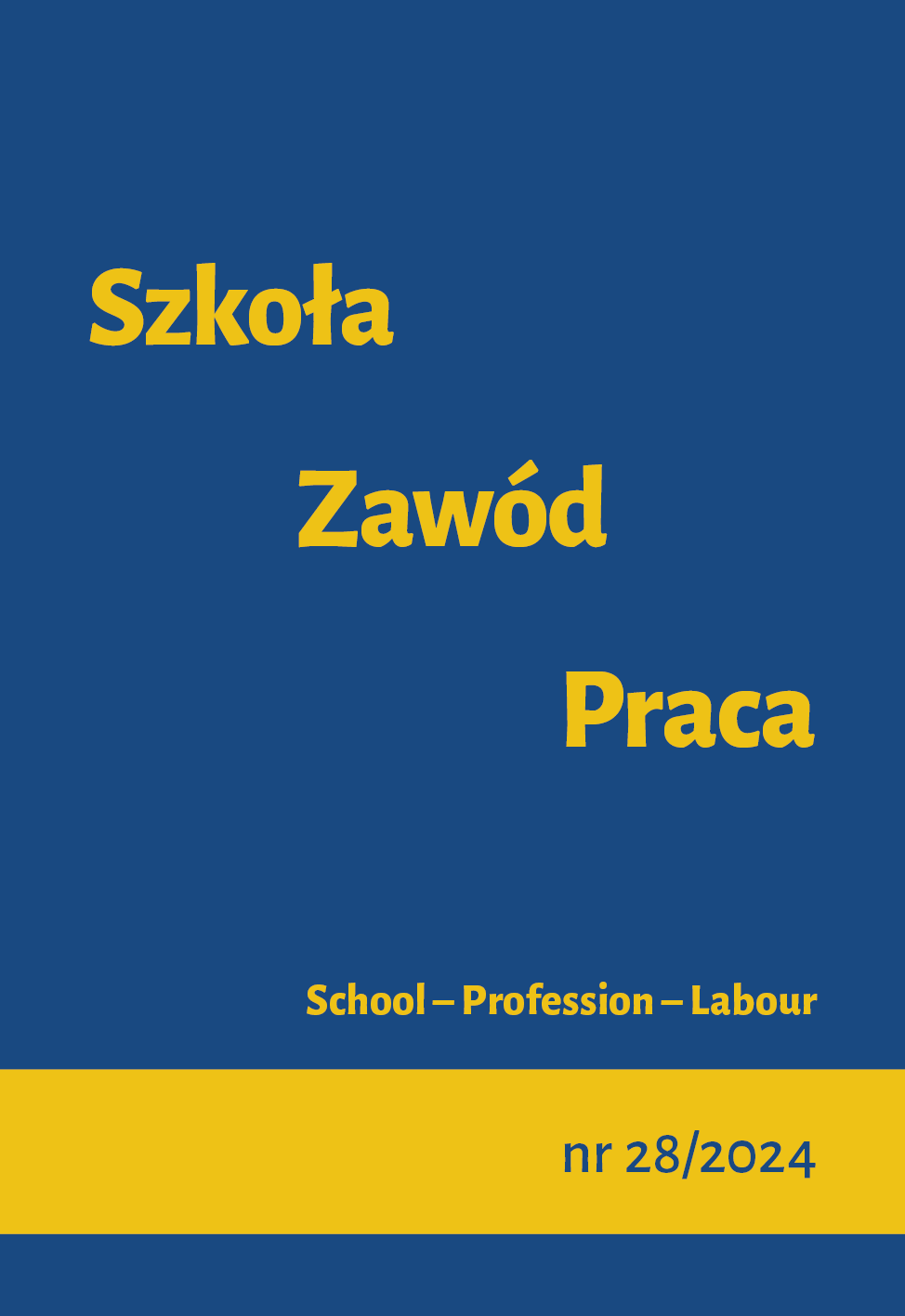Myślenie krytyczne w refleksji studentów – przyszłych nauczycieli
DOI:
https://doi.org/10.34767/SZP.2024.02.08Słowa kluczowe:
myślenie krytyczne, społeczeństwo informacyjne, zarządzanie sobą, rozwój osobistyAbstrakt
Myślenie krytyczne określane jest obecnie jako kompetencja kluczowa – w kontekście radzenia sobie z chaosem informacyjnym dominującym w społeczeństwie globalnej informacji oraz w obliczu wyzwań zrównoważonego rozwoju. Jest niezwykle ważne, aby tę kompetencję posiadali wszyscy obywatele – a szczególnego znaczenia nabiera ona w kontekście edukacji. W artykule podjęto problematykę tego, jak rozumieją i jakie znaczenie nadają kompetencji myślenia krytycznego studenci kierunków o specjalności nauczycielskiej w Uniwersytecie Komisji Edukacji Narodowej w Krakowie. Ta grupa została wyselekcjonowana do badania, założono bowiem, że to właśnie nauczyciele są osobami, które decydują o tym, jakie znaczenie przypisują rozwijaniu tej kompetencji wśród dzieci i młodzieży, i jaką wagę będą w przyszłości dokładać do tego, by ich uczniowie nabywali i rozwijali myślenie krytyczne. Autorzy, wykorzystując metodę jakościowej analizy treści, w nurcie konstruktywistycznym zrekonstruowali refleksje studentów – przyszłych nauczycieli – na temat myślenia krytycznego. Wyodrębniono kategorie analizy, które pozwoliły zrekonstruować, jak rozumieją i jakie znaczenie nadają myśleniu krytycznemu młodzi ludzie, którzy niebawem będą pracować w szkole. Część badań zo
stała sfinansowana w ramach projektu ERASMUS+: CTIS – Critical Thinking in the Information Society: Erasmus+ KA220-HED – Partnerstwa współpracy w szkolnictwie wyższym.
Bibliografia
Aliakbari, M., Sadeghdaghighi, A. Teachers’ perception of the barriers to critical thinking. Procedia-Social and Behavioral Sciences, 70 (2013).
Babbie, E. (2013). The practice of social research. Belmont: Wadsworth Cengage Learning.Baron, J. (1991). Beliefs about thinking. W: J.F. Voss, D.N. Perkins, J.W. Segal (eds.), Infor-mal reasoning and education. Hillsdale: Lawrence Erlbaum Associates.
Baron, J. (2000). Thinking and deciding. Cambridge: Cambridge University Press.Beyer, B.K. Critical thinking. What is it? Social Education, 49(4) (1985).
Bubnys, R., Mróz, A., Zsigmond, I. Critical Thinking as a key competence and the factor of self-development of the modern teacher. Labor et Educatio, 11 (2023).
Czaja-Chudyba, I. Myślenie krytyczne w ujęciu psychopedagogicznym – w kierunku poznaw-czej samodzielności i odpowiedzialności jednostki. Argument. Biannual Philosophical Jo-urnal, 10(2) (2020).
Elder, L., Paul, R. (2020). Critical thinking: tools for taking charge of your learning and your life. London: Rowman & Littefield.
Ennis, R.H. (1987). Critical thinking. New Jersey: Practice Hall.Ennis, R.H. Critical thinking and subject specificity. Clarification and needed research. Edu-cational Researcher, 18(3) (1989).
Ennis, R.H. Critical thinking dispositions: their nature and assessability. Informal Logic, 18(2) (1996).
Ennis, R.H. (2007). ‘Probable’ and its equivalents. W: H. Hansen, R.C. Pinto (eds.), Reason reclaimed: essays in honor of J. Anthony Blair and Ralph H. Johnson. Virginia: Newport News, Vale Press.
Ennis, R.H. Critical thinking. Reflection and perspective. Part II. Inquiry: Critical Thinking Across The Disciplines, 26(2) (2011).
Facione, P.A. (2011). Critical thinking: what it is and why it counts. Research Report. Millbrae: The California Academic Press.
Florek, S. Intuicyjne i krytyczne myślenie moralne w kontekście jego filogenezy i neuropsy-chologii. Słupskie Studia Filozoficzne, 11 (2012).
Halpern, D.F. (2014). Thought and knowledge. New York: Psychology Press.
Hyytinen, H., Nissinen, K., Ursin, J., Toom, A., Lindblom-Ylänne, S. Problematising the equivalence of the test results of performance-based critical thinking tests for under-graduate students. Studies in Educational Evaluation, 44 (2015).
Jagielska, K. Importance of family support in planning educational and professional careers by young adults from Generation Z. Studia z Teorii Wychowania, 15, 2(47) (2024).
Jones, A. Critical thinking historical background of a decade of studies covering the era of the 1980s. International Journal Scientific Technology Research, 8(12) (2019).
Leiner, D.J. Our research’s breadth lives on convenience samples. A case study of the on-line respondent pool “SoSci Panel”. SCM Studies in Communication and Media, 5(4) (2016).
Lipman, M. (2003). Thinking in education. Cambridge: Cambridge University Press.
Łukasik, J. Rozwój osobisty studentów pedagogiki. Edukacja Ustawiczna Dorosłych, 3(94) (2016).
Mróz, A. (2018). Nauczyciel wobec paradygmatu zrównoważonego rozwoju w edukacji. Kraków: Impuls.
Ojala, M. Hope and worry. Exploring young people’s values, emotions, and behavior regarding global environmental problems. Örebro Studies in Psychology, 11 (2007).
Perkins, D. (1995). Outsmarting IQ: The emerging science of learnable intelligence. New York: Free Press.
Rapanta, C., Garcia-Mila, M., Gilabert, S. What is meant by argumentative competence? An integrative review of methods of analysis and assessment in education. Review of Educational Research, 83 (2013).
Reid, J., Anderson, P. (2011). Critical thinking instruction in interesting times. W: M. Ab-delsama (ed.), Proceedings of the 2011 International Business Conference of the Society for the Advancement of Management. Orlando: Society for the Advancement of Management.
Rieckmann, M. Future-oriented higher education. Which key competencies should be foste-red through university teaching and learning? Futures, 44(2) (2012).
Rieckmann, M. Learning to transform the world. Key competencies in Education for Su-stainable Development. Issues and Trends in Education for Sustainable Development, 39(1) (2018).
Rozporządzenie Ministra Nauki i Szkolnictwa Wyższego z dnia 25 lipca 2019 r. w sprawie standardu kształcenia przygotowującego do wykonywania zawodu nauczyciela (Dz. U. 2019, poz. 1450).
Siegel, H. (1988). Educating reason: rationality, critical thinking and education. New York: Routledge.
Siegel, H. (2019). Myślenie krytyczne i indoktrynacja. Bydgoszcz: UKW.
Somekh, B., Noffke, S. (2009). The sage handbook of educational action research. Los Angeles: SAGE Publications.
Taimur, S., Sattar, H. (2020). Education for sustainable development and critical thinking competency. W: W.L. Filho (ed.), Encyclopedia of the UN sustainable development goals. Cham: Springer.
Wasilewska-Kamińska, E. (2015). Myślenie krytyczne jako cel kształcenia. Na przykładzie systemów edukacyjnych USA i Kanady. Warszawa: UW.


